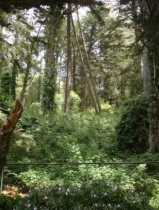
My father watches me approach. The look on his face is complex.
He shakes his head, wondering.
“You look so much like my father,” he says.
Sometimes one single sentence is the very best gift you can give.
He's right: the rangy build, the jaw, the widow's peak. Right now I'm about the age that my grandfather would have been when I first remember him.
He was born in Vienna. I'd always thought that his name was Frank, but recently I found out that his parents named him (for the kaiser, I suppose) Franz Josef.
I'd be willing to bet that he chose Frank himself. Except for songs, he always refused to teach his children any German.
“We're Americans,” he'd say.

















